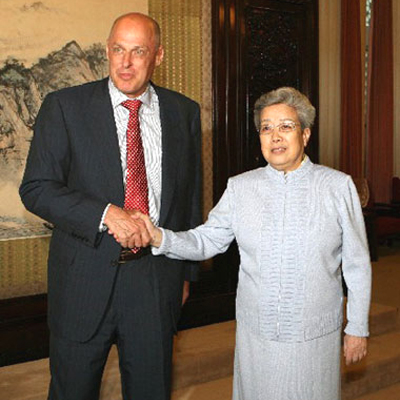China will never constitute an economic threat to any nation nor does it have the power to be, Vice-Premier Wu Yi told visiting US Treasury Secretary Henry Paulson, adding that the US should improve its understanding of China's entire economic situation as well as the challenges facing this nation.
Following a 30-minute private meeting with Paulson, Wu told the US delegation that she was pleased to see that the her counterpart would be briefed in the great gap separating Beijing or Shanghai and backward areas like Qinghai Province.
He traveled to China on Sunday with the first stop in northwest China's Qinghai Province.
Paulson said he knew Qinghai is China's "Water Tower" and the source of the country's major rivers. "I am very pleased to see what the Chinese government is doing to protect and restore this very special area."
"I hope the Qinghai visit will enrich your future testimony to the US Congress," Wu said.
The US Treasury opposed a bill passed by the US Senate Finance Committee last week, which offered up new measures to place pressure China into floating the RMB on the open market.
Earlier, the Treasury refused to name China as a currency manipulator in its semiannual report to Congress. "I will not say anything other than restate the Treasury's view that legislation is not the proper way to proceed and deal with the currency issue," Paulson told Xinhua.
"I believe bilateral talks and engagement to be preferable," Paulson said.
Wu expressed her doubts as to how developed countries saw China as an economic threat when much of the country remains relatively poor. The development of poorer areas such as Qinghai and the feeding and clothing of every Chinese citizen remains the government's priority.
"Who could China threaten? We don't have the ability to so. We do not and will never be a threat to anyone," she stressed.
During another meeting, Wu and Paulson exchanged views on the topics and arrangements for the third session of the SED, which will be held in Beijing in December.
She said the forum, launched by the presidents of the two powers, now had a successful track record with the implementation of promises made at the first two sessions.
Wu said the third round would maintain its heading of focusing on overall, long-term and strategic economic issues, and would keep playing a positive role in promoting China-US economic and trade ties.
US Treasury Secretary Henry Paulson on Tuesday hailed the US-China strategic Economic Dialogue (SED) as a precious aid to the bilateral economic relationship during harder times.
"The SED allowed us to build a strong relationship, which has been useful in keeping our economic relationship on an even keel even during the times of tension," Paulson said on Tuesday evening immediately after his closed-door talk with Chinese Vice-Premier Wu Yi.
Calling the dialogue "responsible for managing the economic relations between the two sides," Paulson said he was dealing with "the most sensitive and difficult issues in order to maintain confidence of both sides."
Paulson also explained that their discussions had encompassed the areas of the environment and energy efficiency, consumer food safety, product safety, investment and balanced growth.
"When we talked about the balanced growth, I pressed for greater currency flexibility," he said.
On food safety, Paulson said American consumers had very high standards in terms of product and food safety, a feeling shared with Chinese consumers.
"We agreed that in today's global marketplace both countries must work together to help our citizens and move forward," he said.
Paulson said he looks forward to speaking with Chinese President Hu Jintao Wednesday afternoon. "I will update him on the latest political and economic developments in the United States, talk about the importance of the SED and the importance of achieving some positive outcomes for both countries."
(Xinhua News Agency, China Daily August 1, 2007)



